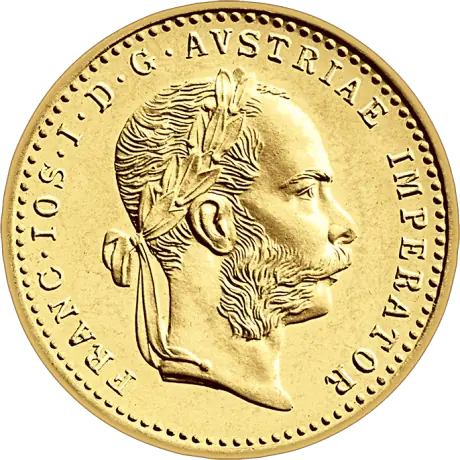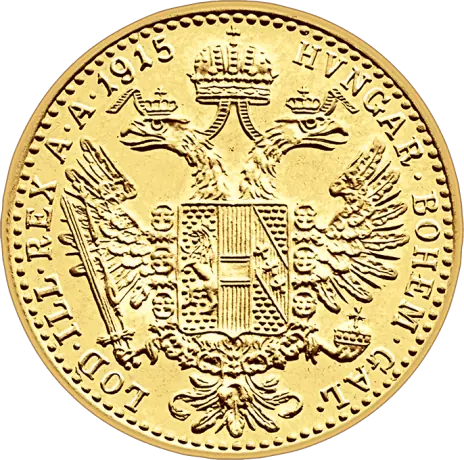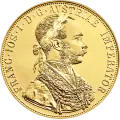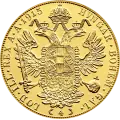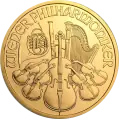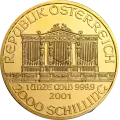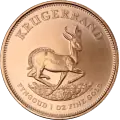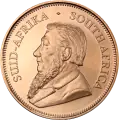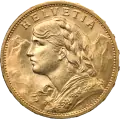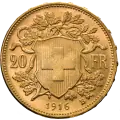1 Ducat | Gold Coin | Bullion Uncirculated
€540.77 | Gross incl. VAT |
Stock expected in 5 days
| Quantity | Premium |
|---|---|
| 1+ | €44.58(8.98%) |
1 Ducat | Gold Coin | Bullion Uncirculated
Ducat History
The term "uncirculated" is used by experts to describe a certain grade of coin preservation. Such pieces generally exhibit very good preservation and show almost no signs of wear. However, these coins may have some damage, such as small scratches or dents.
The term "ducat" originates from the Italian word "ducato." Ducats were gold coins that were widespread throughout Europe from the 14th to the 19th century and originated in medieval Venice. They featured the image of the Doge. "Duca" in Italian translates to "Duke" or "Doge." Austrian ducats, like the one you see here, originated in medieval Venice and were first minted there in 1284. However, it was not until the early 16th century that ducats arrived in Austria and were official currency there until 1858.
These coins were minted as trade gold coins until 1915. The year "1915" appears on all modern reissues and features the portrait of Emperor Franz Joseph, who ruled the Austro-Hungarian monarchy for 68 years. His reign was only surpassed in length by Queen Elizabeth II of England, who reigned for 70 years. On the other side of the coin, you see the double-headed eagle.
The offered coin is therefore an official reissue by the mint “Austrian Mint” with the standardized mint year "1915" for all coins.
The Obverse
You see the portrait of Austrian Emperor Franz Joseph I, used for the first time in 1872. He lived from 1830 to 1916. He wears a laurel wreath on his head, a symbol of victory and glory. Around his portrait, you see: "FRANC IOS I D G AUSTRIAE IMPERATOR." This inscription means: "Franz Joseph I - By the Grace of God Emperor of Austria."
The Reverse
Here you see the coat of arms of Austria with the typical double-headed eagle and the escutcheon. The Rudolf's Crown, as it was called by Emperor Franz Joseph I, serves as the "link" between the two eagle heads. Additionally, you see the orb and the imperial sword, imperial insignia held by the eagle in its claws. The inscription around the edge reads: "LOD ILL REX AA 1915 HUNGAR BOHEM GAL." This translates to: "King of Lodomeria, Illyria, Hungary, Bohemia, and Galicia."
About the Mint "Münze Österreich AG"
This renowned, venerable company, whose roots go back to 1194 and which was first documented in 1203, is the only official minting authority in Austria. In addition to producing coins and medals for collectors and investors, it also supplies circulation coins to many countries around the world. One of the core competencies of Münze Österreich AG is the production of circulation coins for Austria. Since 1988, the company has been a wholly-owned subsidiary of the Austrian National Bank. It is located in the heart of Vienna at Heumarkt.
| Country | Austria |
| Weight1 | 3,44g |
| Product number | 10286 |
| Series | Ducat |
| Mint | Austrian Mint |
| Purity | 986/1000 |
| Currency | Ducat |
| Face value | 1 |
| Product packaging | Sachet |
| Bulk packaging | 20 in foil tray |
| Diameter, mm | 20.00 |
| Thickness, mm | 0.75 |
Buy back
Sell your bullion coins and bars back to us with hassle-free and secure buyback service.
Enjoy competitive rates based on real-time metal prices.
Why Buy from Us
- StoneX Group – NASDAQ-listed, global reach
- LBMA member
- Over 100,000 satisfied clients in the UK and Europe
- Real customer reviews
